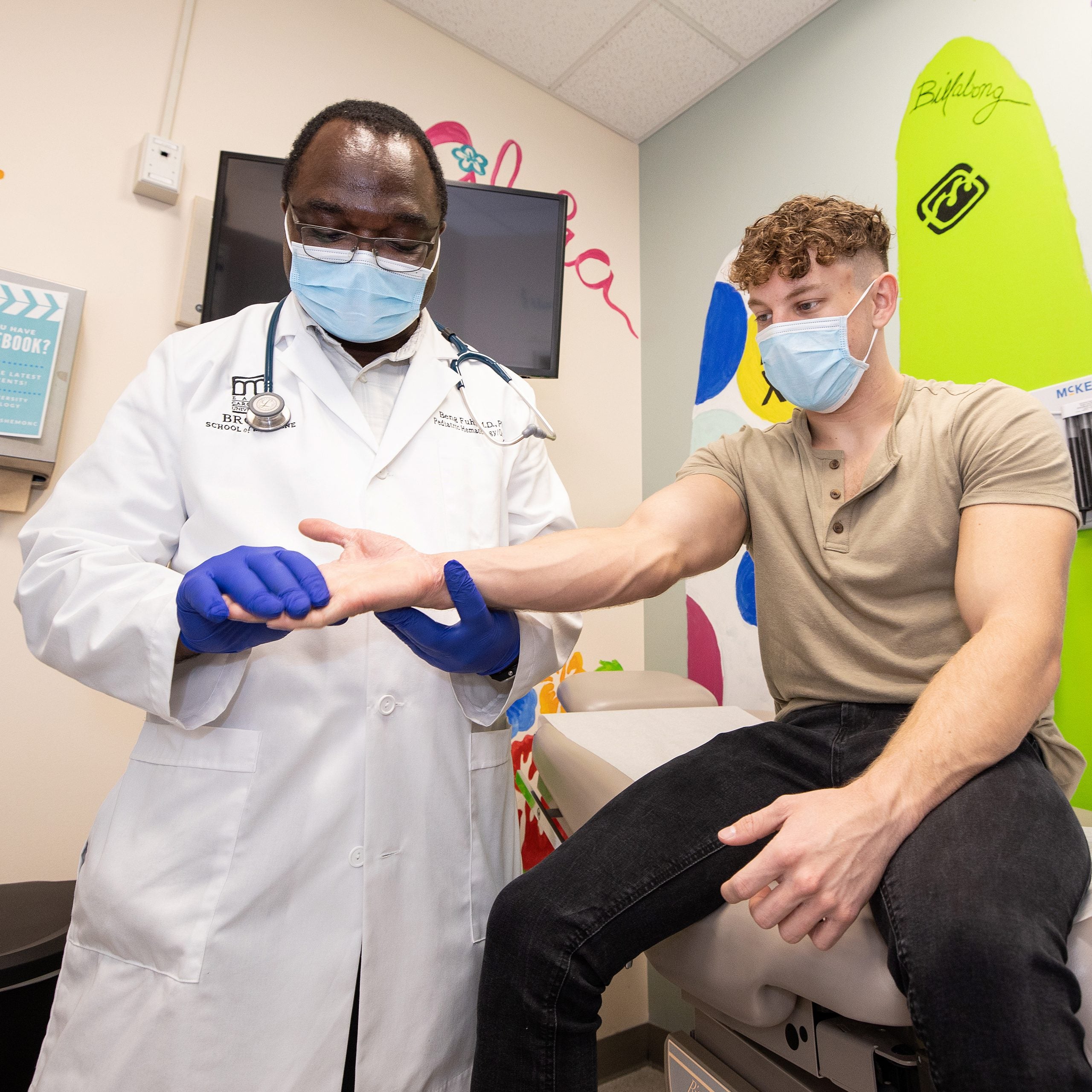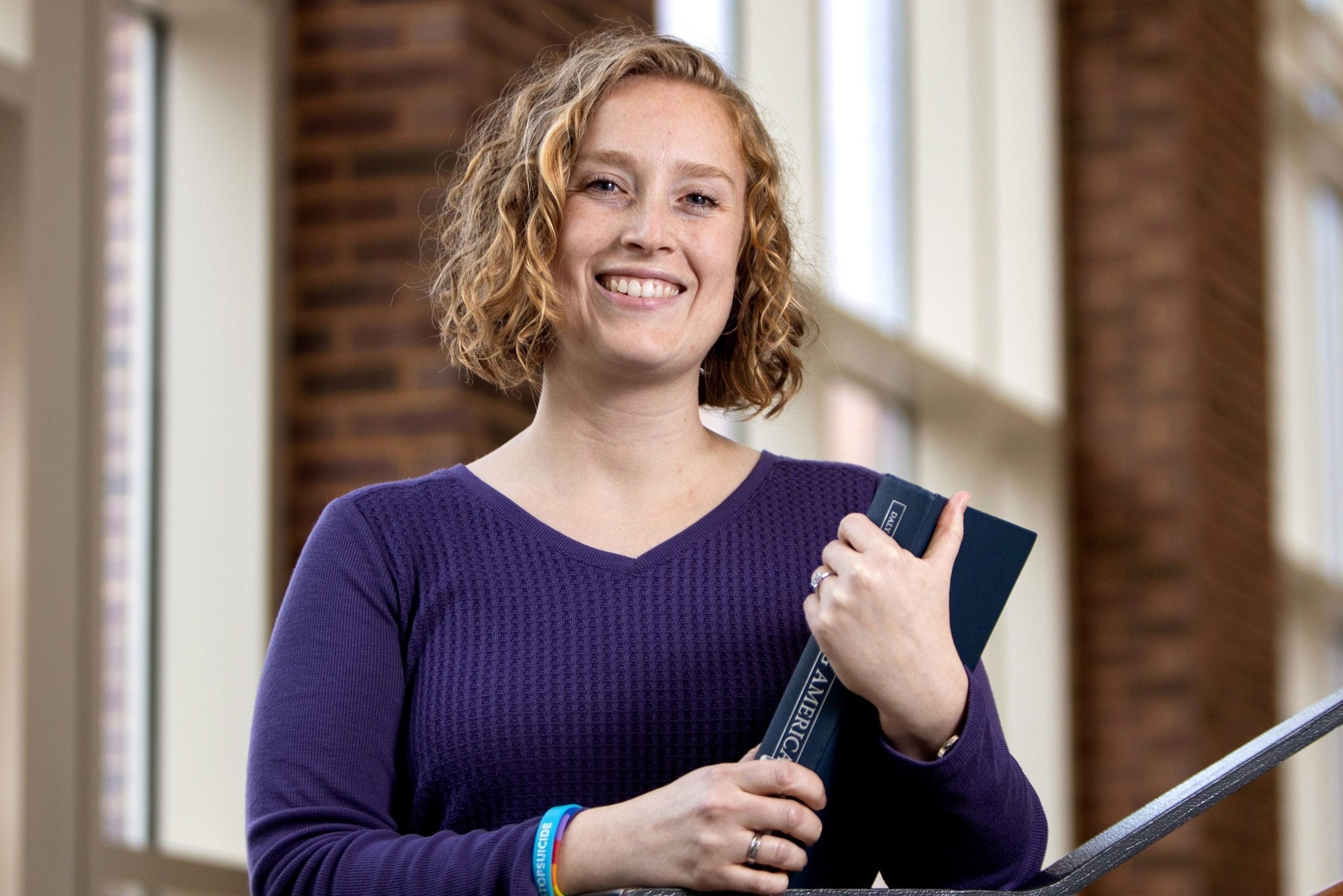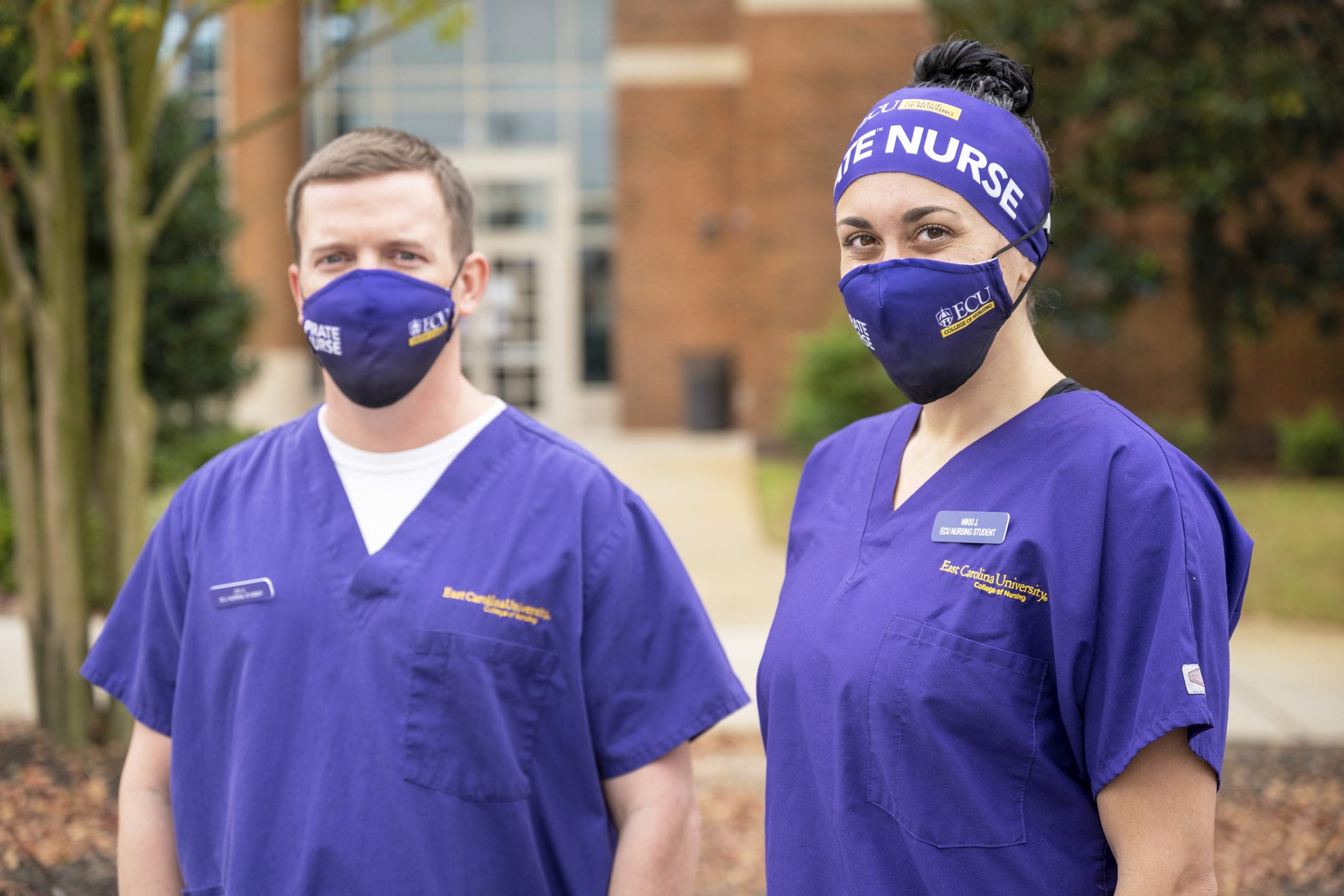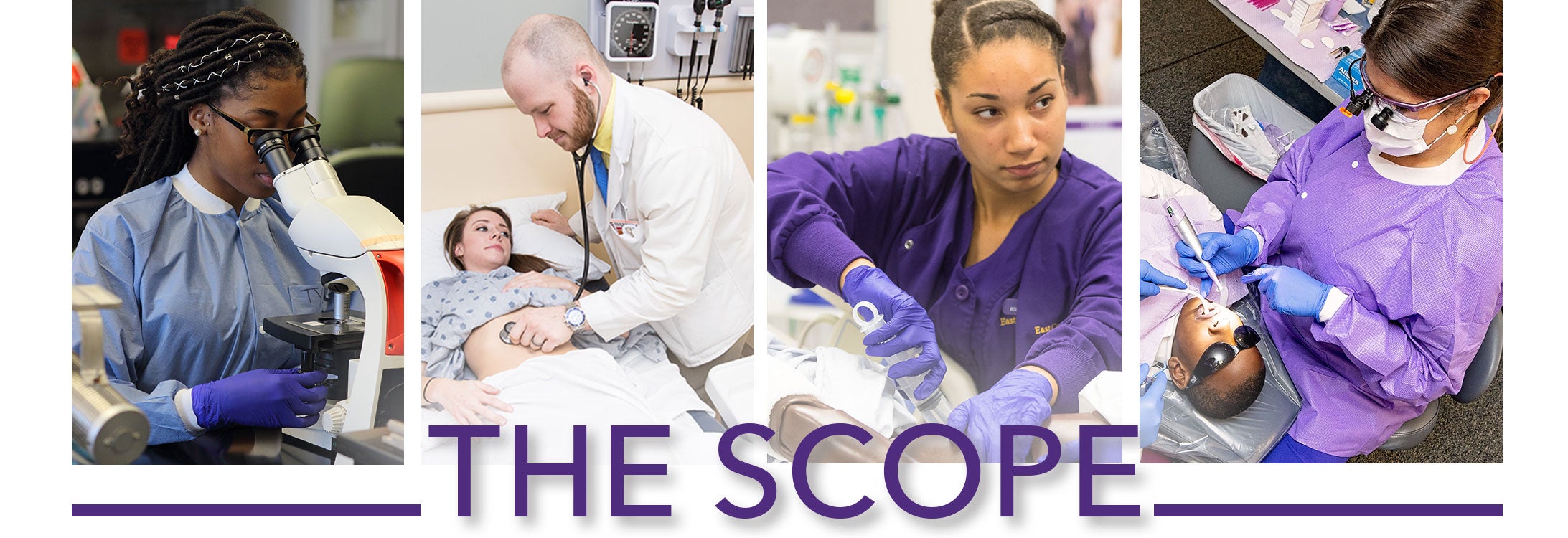October 2020
Welcome to “The Scope,” the newsletter of the ECU Division of Health Sciences.
Welcome to the October issue of The Scope, the newsletter of the ECU Division of Health Sciences.
From time to time, I’ll ask another leader, provider, educator or other notable member of the DHS community to share a message with you about their college, school or program.
This month, we hear from Dr. Robert Orlikoff, dean of the College of Allied Health Sciences, as we celebrate the highlights from the past few weeks.
Mark Stacy, MD
Dean, Brody School of Medicine
Vice Chancellor, Division of Health Sciences
Dear Colleagues,
They say that hindsight is 20/20. It seems fair to assume that few had the foresight to imagine just how 2020 would unfold. This year has provided an unprecedented learning opportunity, particularly for those of us who provide health care and are responsible for preparing the next generation of health care professionals.
Like me, I’m sure you share the hope that comes with putting our awful experience with the novel coronavirus pandemic in the rearview mirror. Never has it been clearer that successful regional transformation, the sine qua non of our university’s mission, must be built on a secure foundation of health, safety and wellness. I know that we will be stronger for having risen so flexibly, collegially and responsibly to meet the challenges of our current health crisis.

Robert F. Orlikoff, PhD
As demonstrated repeatedly across the country and throughout the world, social and economic advancement is simply not possible without first attending to the health and capability of individuals, families and communities. I am gratified to work with such dedicated individuals in the ECU Division of Health Sciences, finding ever more innovative means to deliver our programs while ensuring that each student is fully prepared to advance in their curriculum, to graduate in a timely manner and to provide the highest quality professional services.
With a 52-year history, the College of Allied Health Sciences has maintained a focus on primary care, support of our health care system and rehabilitation. Accounting for the largest proportion of the health workforce, allied health professionals practice individually and in multidisciplinary teams to provide an extraordinary range of diagnostic, technical, therapeutic and direct patient care. They also provide support services that allow the health care system to function ever more efficiently and effectively.
Today, the College of Allied Health Sciences has grown to become the state’s largest university provider of allied health professionals. Its professional diversity is reflected in its nine academic departments offering more than 25 degree and certificate programs. Our 1,100 students will join more than 12,000 alumni as dietitians, audiologists, physician assistants, clinical laboratory personnel, speech-language pathologists, physical and occupational therapists, clinical and rehabilitation counselors as well as health system and information managers, among other health professionals.
Allied with medicine, nursing and dentistry, our graduates help people of all ages communicate, care for themselves, eat a nutritious diet, cope with the stresses of life, address the impact of alcohol or drug use, adapt to the physical demands of everyday activities and remain physically active and fit. Whether our services be preventive, administrative or rehabilitative, our focus is always on wellness and ensuring that our patients get the most out of life.
The College of Allied Health Sciences is dedicated to outreach. The local community is served by the Navigate Counseling Clinic run by the Department of Addictions and Rehabilitation Studies, the Speech-Language and Hearing Clinic operated by the Department of Communication Sciences and Disorders and two physical therapy clinics, one of which is operated solely by the students in our Doctor of Physical Therapy program.
In addition, the College hosts an interprofessional clinic for older adults to assess their risk of falling, while the Department of Occupational Therapy maintains the Research for the Older Adult Driving Initiative, or ROADI, that serves as an evaluation, rehabilitation, and research center for older adult drivers, recently extended to driving-age adolescents with Autism Spectrum Disorder. This commitment to serving the rehabilitation needs of our local communities certainly applies to our graduates, nearly 75% of whom remain to work professionally within the state, with more than half practicing in one of the 29 counties of eastern North Carolina.
The difficulties faced over much of the current year have highlighted the importance of our mission. Our faculty, staff and students do what they do for reasons that are both personal and related to the greater good. Partnering interprofessionally across the ECU Division of Health Sciences, we seek to help people better care for themselves, do for themselves and empower them so that they may participate in life as fully and meaningfully as possible. That is transformation at its finest.
Robert F. Orlikoff, PhD
Dean and Professor
ECU College of Allied Health Sciences
Education
In the Division of Health Sciences, a milestone for one college or school is a triumph for us all. This year, the College of Nursing celebrates its 60th anniversary—during a time when the value and dedication of nurses is more evident than ever. The ECU nursing community marked the occasion in mid-October with a virtual Homecoming and 60th anniversary celebration that ended with a Coast-To-Coast Toast from Dean Sylvia Brown.

The ECU College of Nursing celebrated its 60th Anniversary this month. (ECU College of Nursing file photo)
The event capped off weeks of virtual reunions where alumni from the college reconnected with each other via Microsoft Teams and shared their favorite memories of their time at the college. The College of Nursing website also has more information about the college and its observation of this moment in its history.
Marking another division milestone, Dr. Wanda Wright has been named the inaugural assistant dean for diversity, equity and inclusion for the ECU School of Dental Medicine.
Wright, who has been with the school since 2015, is also assistant professor and division director of dental public health. In her additional role, she will oversee and coordinate all diversity, equity and inclusion-related initiatives and programming for the SoDM. She will serve as a member of the School’s senior leadership team and will contribute to the recruitment, retention and success of underrepresented faculty, staff, students and residents. The creation of this position reiterates the SoDM’s commitment to its mission that emphasizes equity and diversity as core characteristics.
“Those of us who have the pleasure of working and serving alongside Dr. Wright understand just how passionate she is about changing the world, starting right here in eastern North Carolina,” said Dr. Greg Chadwick, dean of the dental school. “We are fortunate to have her unique blend of experience and expertise carrying us forward in our commitment to diversity that spans our entire school.”
Dedicated and talented providers, faculty, staff, residents and students that make up the Division of Health Sciences work not only to make a difference on campus—they also seek to make a national impact in their fields, from teaching to policy change and patient care. From awards to appointments on national professional boards, ECU’s expertise is on showcase and our DHS community is consistently called upon to participate in dialogue for the good of health care in North Carolina and beyond.
Video of College of Nursing 60th Anniversary Retrospective. Visit this video on YouTube for the closed-captioned version.
Patient Care
DHS providers make a difference on a national stage as well. An ECU-Vidant team of surgeons and oncologists successfully treated a rare case of pediatric cancer that made them one of few teams worldwide that has treated the disease with a positive patient outcome.

Oncology Pediatrician Dr. Beng Fuh, evaluates the progress and healing of Luke Haithcocks’ hand. (Photo by Rhett Butler)
When he was 15, Luke Haithcock—now an ECU undergraduate student—was diagnosed with monophasic synovial sarcoma, an aggressive soft tissue malignancy that makes up only 10% of soft tissue sarcomas, which are themselves very rare in children. It affects only one to three patients per one million people.
Haithcock’s story was told in observance of Childhood Cancer Awareness Month. He and his parents chose a health-care team of East Carolina University and Vidant Health providers that used a collaborative approach to treatment—making the case a worldwide example of successful treatment of this cancer.
“We will be able to share our treatment strategies and experience with others around the world who may be confronted with similar cases,” said Dr. Beng Richard Fuh, director of the ECU Brody School of Medicine Division of Pediatric Hematology and Oncology and an oncologist and pediatrician at Vidant Health.
According to the American Childhood Cancer Organization, childhood cancer remains the number one disease killer of children in the United States. Close to 1 in 285 children in the U.S. will be diagnosed with cancer before their 20th birthday, and each year in the US, about 15,780 children under 19 years old will be diagnosed with cancer. At any given time in the U.S., there are approximately 40,000 children on active treatment for cancer, and 20% of children with cancer in the U.S. will not survive it.
“This is a story of hope,” said Dr. Yifan Guo, clinical assistant professor of plastic and reconstructive surgery in the Brody School of Medicine’s Department of Surgery, and a Vidant Health surgeon. “We’re not just doctors; we don’t see our patients as a business. We see them as vulnerable, and we want to do what’s best for them. We are hopeful that this will make ECU a center for treatment of this type of cancer now that we have experience with it.”
Three years later, Haithcock is at ECU, preparing for a career that will enable him to work with other cancer patients through guidance on health and wellness.
“Physically, ECU has been essential to my healing process,” he said. “Academically, ECU is preparing me for a life of making a difference in the lives of others.”
Video of A Rare Cancer Meets Determination. Visit this video on YouTube for the closed-captioned version.
Research
Dr. Espen Spangenburg, associate professor in Brody’s Department of Physiology, has received a $750,000 grant from the National Institutes of Health to further explore the implications of a skeletal muscle that can function without oxygen. Spangenburg leads a lab where the skeletal muscle was discovered; he is principal investigator of the grant project in collaboration with colleagues at the University of California–San Diego.

Dr. Stefan Clemens, along with associate professor Kori Brewer, examine a mouse’s spinal column in their lab at the Brody School of Medicine. Clemens’ work with mouse models was essential in helping him develop his Restless Legs Syndrome treatment. (Photo taken by Cliff Hollis prior to COVID-19)
The grant is sponsored by the National Institute of Arthritis and Musculoskeletal and Skin Diseases and will pave the way for researchers to explore whether the skeletal muscle discovered here could have far-reaching health implications by protecting against the effects of ischemia— an inadequate blood supply to an organ or part of the body, especially the heart muscles.
“We have identified a skeletal muscle that can work for short periods of time without oxygen,” Spangenburg said. “The goal of the grant is to define the mechanism the identified muscle uses to function without oxygen and determine if the mechanism can be used to protect other tissue from an ischemic insult.”
Metabolic disease and cardiovascular disease often have an underlying issue of either acute or chronic ischemia exposure that exacerbates the condition, Spangenburg explained. There are currently very few options to lessen ischemia-induced tissue dysfunction.
“Ischemia affects skeletal muscle in numerous clinical conditions including various myopathies, peripheral artery disease (PAD), compartment syndrome, severe limb injury, etc., not to mention coronary occlusion in cardiac muscle,” Spangenburg said. “The identification of a mechanism that provides ischemia resistance would overcome one of the longest-standing challenges faced by clinicians.
“Our hope is to identify a mechanism that we can leverage to either prevent or attenuate ischemia-induced damage that will ultimately improve the mortality of individuals afflicted with these health conditions,” he said.
An East Carolina University faculty member’s latest patent may change the way Restless Legs Syndrome (RLS) is treated, leading to more effective care over a longer period of time for patients.
Stefan Clemens, an associate professor in the Brody School of Medicine’s Department of Physiology, was awarded U.S. Patent 10,751,327 on Aug. 25 for his novel treatment method for the treatment of RLS.
Restless Legs Syndrome is a nervous system disorder that affects between 5% and 8% of the population in the United States. Those suffering from RLS experience an uncontrollable urge to move their legs caused by an unpleasant sensation. While the exact cause of RLS is still unknown, the syndrome is typically treated with dopaminergic drugs — medications that replace or prevent the loss of dopamine — that have a high initial effect but over time lose their effectiveness.
“The problem is that patients on these dopaminergics eventually develop a side effect called augmentation,” Clemens said. “Their symptoms get worse while taking the current medication used for treatment.”
Classic RLS treatments act on a dopamine receptor known as D3 that has a suppressive effect in the nervous system. However, Clemens’ lab has shown in animal models that over time this medication leads to an increase of a different, excitatory receptor subtype, D1. This increase of the D1 receptor might be the cause of augmentation.
Clemens’ patent proposes a new treatment method that targets the increased D1 receptor levels in RLS patients suffering from augmentation, leading to reduced activation of D1 receptors while providing traditional therapy relief from RLS.
“Our lab postulates that this new compound will maintain long-term efficacy for RLS,” Clemens said. “If augmentation begins, we predict that we can reduce D1 receptor activation in patients and balance things back out, keeping the treatment effective.”
DHS Spotlight
In the spirit of excellence in education and a collaborative campus, we will be highlighting a variety of students, staff and faculty who represent the colleges and schools in the Division of Health Sciences.
This month, we meet Dana Cea, a College of Allied Health Sciences doctoral student in rehabilitation counseling and administration.

Dana Cea. Photo by Rhett Butler
Dana Cea is an advocate for people with disabilities and the LGTBQ community.
A third-year doctoral student in rehabilitation counseling and administration, Cea’s passion for advocacy stems from identifying as queer along with personal experience dealing with mental health disabilities, an autoimmune disorder and hearing issues.
“For me, it’s pretty personal because those overlap with me,” she said. “Also, I just found in connecting with others and hearing their experiences of what they went through and what was or wasn’t helpful to answer, ‘What was helpful?’”
For her master’s degree, Cea developed a clinical guide for mental health professionals working with clients who identify as LGTBQ.
“I think it just comes down to respect and knowing how to talk to people. How do you not put your foot in your mouth? And if you do, how do you apologize and come around from that?” Cea said. “I think that personal experiences of my own, experiences of others and seeing the impact that I can have in sharing information with others is what has driven me to get where I am.”
In her doctoral program, Cea is focusing on leadership, advocacy and LGTBQ components within suicide awareness. Another area she is interested in is trauma.
“I find a real connection to trauma,” Cea said. “I have some trauma training and I incorporate that into everything. I think it helps, especially with the populations I’m working in, to be trauma-informed so that you’re not re-traumatizing someone or asking questions that can be triggering.”
Cea said her favorite part of the program is having the freedom to incorporate her interests into everything she does. Her dissertation topic is concentrated on defining what is helpful for students who identify as transgender or gender non-binary, as well as others who have a disability and are served by disability support services.
She is investigating which disability support services lead to the success of those transgender/gender non-binary students while incorporating this into every class she teaches. Cea lectures master’s degree students on how to work with transgender/gender non-binary individuals.
Philanthropy
Coinciding with and in honor of the College of Nursing’s 60th anniversary celebration, the ECU Medical and Health Sciences Foundation Inc. has kicked off a new initiative called Legacy Launch. The initiative aims to raise funds for scholarships and, at every graduation beginning in December 2020, effectively “launch” new College of Nursing graduates into the profession with customized Pirate Nurse personal protective equipment.

(Photo by Jeremy Smith from left to right) College of Nursing students Jon Upchurch and Nikki Justice wear masks that were provided by the ECU Medical and Health Sciences Foundation.
So far, more than $10,000 has been raised for the Legacy Launch, which is also a way to strengthen ties with new College of Nursing alumni and acknowledge the important role of nurses during the COVID-19 pandemic and beyond.
Proceeds will benefit the College of Nursing Beacon Scholarship Fund. The ECU Beacon Scholarship Program is a key initiative to help ECU recruit and retain talented undergraduate students. In Fall 2021, we will welcome our first class of Beacon Nursing Students. These students will receive a $1,000 scholarship each year for their junior and senior years in the nursing program. Your gift to Legacy Launch not only honors a new Pirate Nurse, it also provides scholarship support to future nursing students.
“The Legacy Launch was created not only to support scholarships for future students, but to honor our newest College of Nursing graduates,” said Dr. Sylvia Brown, dean of the College of Nursing. “As they enter a profession that is needed right now more than ever, we want them to have a reminder that we are committed to their success moving forward as Pirate Nurses.”
Learn more here about how you can support the College of Nursing Legacy Launch.
